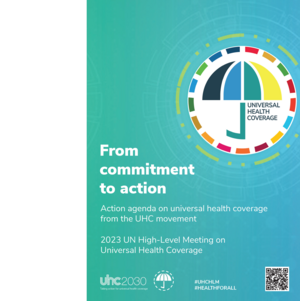What is the UHC Action Agenda?
The Action Agenda from the UHC Movement provides action-oriented policy recommendations to strengthen resilient and equitable health systems, advance UHC and health security, and deliver on the commitment to achieve health for all by 2030. It rallies countries and stakeholders behind a set of concrete actions and milestones, and strengthens coherence in political processes, including the health-related UN high-level meetings, the G7 and the G20.
Developed through a 7-month process of consultations with a wide range of stakeholders, it represents a consensus document from the UHC Movement. It was used by UHC advocates at the interactive multi-stakeholder hearings on health in May, and was presented to the President of the UN General Assembly to inform the 2023 Political Declaration on universal health coverage.
How to use the UHC Action Agenda
In order for governments to demonstrate their political commitment to a healthier, fairer and safer world and prioritize health and UHC in their laws and budgets, they must:
- Provide strategic leadership at the highest political level to champion health and UHC as national political priorities through a whole-of-government approach
- Increase and stabilize levels of public spending to make health systems more resilient and equitable, while prioritizing investment in primary health care and strengthening financial protection, with a focus on people in vulnerable and marginalized situations.
- Tailor health policies to respond to people’s needs, and secure trust through inclusive governance mechanisms that allow social participation.
We encourage UHC advocates to continue using the Action Agenda when asking their governments to translate political commitments from the 2023 Political Declaration into action. Use our social media advocacy toolkit and the UHC Day advocacy letter to promote the Action Agenda and continue to accelerate progress towards UHC!
Time for action
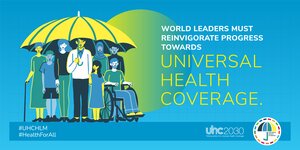
Urgent action is needed now to make universal health coverage a reality for everyone, everywhere. Universal health coverage means that all people have access to the quality health services they need, when and where they need them—including during emergencies—without risk of financial hardship. However, at least half of the world’s population still lacks access to essential health services. What's more, each year, about 70 million people are pushed into extreme poverty after paying for services out of their own pockets, rendering the right to physical and mental health unattainable for far too many.
In 2019, at the United Nations High-Level Meeting on Universal Health Coverage, world leaders endorsed the most ambitious, comprehensive political declaration on health in history, committing to ensuring that all people have access to “quality essential health services and quality, safe, effective, affordable, and essential medicines, vaccines, diagnostics, and health technologies”, without experiencing financial hardship and without discrimination, by 2030. Although the majority of countries recognize universal health coverage as a goal, reflected in laws and national plans, there has been little implementation and inadequate public financing for universal health coverage.
The COVID-19 pandemic highlighted the need to build universal health coverage for times of crisis and calm, making clear that universal health coverage and global health security are two intertwined goals. As the climate crisis deepens, armed conflicts worsen, inequality widens, pandemics occur more frequently and economies become more volatile, countries with equitable and resilient health systems will be better able to prevent, prepare for and respond to health emergencies that threaten global health security.
Even before the COVID-19 pandemic, progress on achieving universal health coverage was not on track, and we are now even further away from reaching our goals. The pandemic has severely disrupted health systems and essential health services. With the combined health and economic impacts of COVID-19, many people face greater financial constraints to accessing care. Financial hardship is likely to worsen for those who must pay out-of-pocket for health services, particularly for vulnerable and disadvantaged populations. While public expenditure on health increased during the pandemic, the levels of health spending have been volatile in low- and middle-income countries over the past two decades and may drop again in the near future.
The means to achieve universal health coverage and health security is strengthening health systems. The most inclusive, equitable, cost-effective approach is primary health care. Ninety per cent of essential interventions for universal health coverage can be delivered through primary health care. Primary health care is also widely regarded as key to strengthening the resilience of health systems to prepare for, respond to and recover from shocks and crises. To achieve universal health coverage, leaders must make sustainable investments in health systems, properly resourcing and protecting health and care workers, and working with communities, civil society and the private sector. Leaders should also address the factors that are hampering progress towards universal health coverage and health security, and promote equity for vulnerable and marginalized groups, gender equality, accountability, human rights and economic prosperity.
World leaders have a unique opportunity to reinvigorate progress towards delivering health for all if they take urgent action to implement universal health coverage reforms, with accountability. Seizing the opportunity of the three United Nations (UN) high-level meetings on health in 2023 (universal health coverage; pandemic prevention, preparedness and response; and tuberculosis) and beyond, countries and stakeholders can build universal health coverage as a goal and a framework for health and well-being as well as to address broader global health challenges, strengthen national and international resilience and improve global health security.
Action area 1: Champion political leadership for universal health coverage.
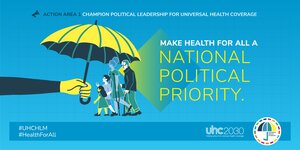
Action area 1: Champion political leadership for universal health coverage.
Political leaders have now experienced how important universal health coverage is to their societies and economies, given their experiences during the pandemic and the ongoing impact of conflicts and the climate crisis.
Governments have the power and responsibility to realize people’s right to health as part of their social contract. To do so requires bold leadership, political will, prioritization and a focus on cohesive action and implementation by heads of government, ministers of health, economy, finance and other relevant ministries, and parliamentarians. Political leadership is crucial for embedding universal health coverage as a goal in national health policy frameworks and budgets, and to ensure that the right to health becomes a reality for all people, everywhere.
Priority actions:
- Provide strategic leadership at the highest political level to champion universal health coverage as a national political priority through a whole-of-government approach. Incorporate universal health coverage as a goal in national health policy frameworks, strategically connected to broader inter-ministerial priorities such as health security, social stability, climate, economy and finance.
- Strengthen and finance a comprehensive essential health benefits package based on epidemiological needs and disease burden, prioritizing primary health care as a foundation of health systems for both universal health coverage and health security. Adequately resource the health workforce, integrate health promotion and disease prevention programmes and interventions, and address the social determinants of health by connecting and financing shared services and capacities.
- Encourage and support subnational governments, communities, civil society and private sector leadership and mobilization for universal health coverage. Ensure local ownership to affirm the primary role and responsibility of governments at all levels by working with patients, civil society, communities and the private sector to influence progress towards universal health coverage.
2025 Milestones
- National and subnational health policy frameworks include specific, measurable goals and targets to increase universal health coverage by expanding primary health care and with a comprehensive essential health benefits package, improving financial protection and extending population coverage, consistent with achievement of the Sustainable Development Goals (SDGs).
Action area 2: Leave no one behind.

Action area 2: Leave no one behind.
Health is enshrined as a fundamental right of every human being, and it is the duty of governments to protect, promote and fulfil the right to health. Countries will benefit economically and socially by investing in health because universal health coverage makes a significant contribution to reducing poverty and promoting equity and social cohesion.
While many countries have reduced barriers to health care and financial protection, inequality for vulnerable and disadvantaged groups, including youth, women, refugees, migrant and displaced populations, has increased. This unequal impact will be exacerbated by ongoing crises, including climate change. At least half of the world’s population lacks access to essential health services, and, each year, about 70 million people are pushed into extreme poverty after paying the cost of essential health care out of their own pockets.
The COVID-19 pandemic has further widened inequitable access to the health services that people need, highlighting the need for universal health coverage in times of crisis and calm. Ensuring that the design of intersectoral policy addresses inequality in national health and other policy frameworks will improve equitable access to health services and contribute to financial protection for vulnerable and disadvantaged groups.
Priority actions:
-
Ensure that all national health policy frameworks address the health needs of vulnerable and disadvantaged groups throughout their life course. Commit to leave no one behind by ensuring universal access to high-quality health services without financial hardship. Prioritize a comprehensive package of essential health benefits, with primary health care as the foundation of health systems, and ensure that the most vulnerable and disadvantaged populations have access to and use the package.
-
Remove the barriers of various types of discrimination from all national and local health policy frameworks. Redesign multi-sectoral policies to include anti-discrimination, accessibility and progressive universalism, and ensure alignment with international human rights instruments and other international conventions. Include nongovernmental, community and other service providers that specifically address vulnerable and disadvantaged groups in the design of universal health coverage policy.
-
Collect the best available knowledge and information to design the policy, and measure progress in universal health coverage in order to leave no one behind. Monitor and evaluate progress with core data indicators and analyses, including national indicators of achievement of the SDGs, the index of universal health care service coverage, and data on access to the essential health benefits package, primary health care, financial protection,and coverage. Ensure that civil registration is institutionalized and vital statistics are collected routinely as a core set of population health statistics. Routinely disaggregate data by stratifiers, including gender, age, race, class, geography and (dis)ability, to ensure that no one is left behind.
2025 Milestones
-
National health policy frameworks prioritize vulnerable and disadvantaged groups throughout their life course by strengthening universal access to high-quality health services and products.
-
Policies are designed, domestic resources are mobilized, and budgets are allocated to ensure anti-discrimination, accessibility and progressive universalism, and countries monitor and evaluate progress according to agreed indicators of attainment of the SDGs, including routine analysis disaggregated by stratifiers such as gender, age, race, class, geography, and (dis)ability.
Action area 3: Adopt enabling laws and regulations.

Action area 3: Adopt enabling laws and regulations.
Policies, laws and regulations that integrate universal health coverage and health security and create an enabling environment for use of health technologies and innovations will strengthen future economic and social resilience.
Strengthening implementation of universal health coverage reforms is critical, and parliamentarians and other policy-makers have key roles to play. National health policy frameworks, including essential health benefit packages, must be based on sound legal and regulatory frameworks and institutional capacity, which are crucial for implementing the commitments of universal health coverage in a way that is responsive to people’s needs, consistent with international agreements and leave no one behind.
Priority actions:
-
Create enabling legislative frameworks that strengthen health systems. Undertake constitutional reforms, when appropriate, and enact and implement laws in line with international agreements and standards, including human rights instruments and the International Health Regulations (2005).
-
Implement policies, laws and regulations for a comprehensive essential health benefits package, financial protection, primary health care and integrated services to support universal health coverage and health security. Adopt the ethical, integrated, responsive legal and regulatory frameworks necessary to create and sustain effective health institutions, the health workforce and health-care ecosystems in all sectors and levels of government to accelerate implementation, including for prevention and services for addressing the determinants of health. Ensure that health programmes are adequately and sustainably funded, and allow for innovative care delivery models to optimize the roles of all health workers.
-
Adopt policies, laws and regulations that strengthen ecosystems for health-care technology and innovation to accelerate progress towards universal health coverage. Expand safe, accessible, affordable use of health technologies and innovations, focusing on those that extend universal health coverage and quality of health services, such as Internet connectivity, common use of digital platforms and telemedicine. To create a sustainable ecosystem, strengthen assessments of health interventions and technology, develop legal frameworks for data governance, and promote health literacy and access of patients to their own data.
2025 Milestones
-
Laws and regulations have been enacted and resourced to accelerate universal health coverage reforms in line with the SDGs targets and to enable safe, accessible, affordable use of health technology and innovation.
-
Measurable national targets for implementation of the essential health benefits package, financial protection, primary health care and integrated services that support universal health coverage and health security are set in laws and regulations.
-
Progress is monitored and evaluated.
Action area 4: Strengthen the health and care workforce to deliver high-quality health care.
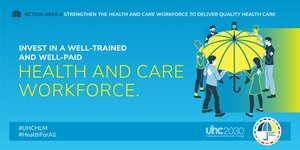
Action area 4: Strengthen the health and care workforce to deliver high-quality health care.
The health and care workforce is essential for ensuring healthy people, societies and economies and plays a crucial role during pandemics, conflicts, natural disasters and other emergencies. In all situations, women play a prominent role, delivering most front-line essential health and care services.
Achieving universal health coverage by 2030 requires a strong, safeguarded, protected health workforce that delivers high-quality health and care services. Shortages of health and care workers where they are needed most and their challenging work environment and conditions, however, threaten the achievement of universal health coverage. This may be further exacerbated by mobility and migration from low- and middle-income countries to resource-rich countries and from rural to urban areas.
Priority actions:
-
Implement existing international agreements to recognize and resource the health and care workforce as the foundation of resilient health systems. Ensure gender equity in leadership roles, close the gender pay gap, and recognize and remunerate unpaid and underpaid health and care workers, including community health workers. Affirm commitment to the World Health Organization (WHO) Global Strategy on Human Resources for Health, the conclusions of the UN High-level Commission on Health Employment and Economic Growth, and the Working for Health 2022–2030 Action Plan. When health workers are attracted through international migration, invest in health workforce development in their countries of origin.
-
Apply robust planning and financing to retain, expand, and protect the health and care workforce. Develop national plans for action and investment in the workforce to increase and sustain health financing and planning for job creation and the recruitment, development, compensation, training and retention of the health workforce, particularly community health and primary care workers. Provide healthy, safe, decent working conditions aligned with the WHO Global Health and Care Worker Compact, and design policies to address the unequal burden of unpaid work. Safeguard and protect the health and care workforce, including front-line and community health workers. Implement the WHO Global Code of Practice on International Recruitment of Health Personnel.
-
Invest in innovative care delivery models to improve the quality of health and care and foster trust. Deliver integrated services that people trust and want to use by ensuring that the services are respectful, fully responsive, proactive and well managed, with reliable entry points in every community. Invest in institutions to train and educate the health and care workforce for the future, and monitor and evaluate the quality of care. Create enabling ecosystems for health-care technology and innovation. Develop innovative care delivery models, led by multi-disciplinary teams of health and care workers, such as nurses, midwives and associated health professionals, and promote advanced practice.
2025 Milestones
-
Consistent with achievement of target 3.c of the SDGs, ensure that national health policy frameworks include plans for workforce action and investment to increase financing, recruitment, development, compensation, training and retention of health workers.
-
Address workforce shortfalls.
-
Create financial plans to properly compensate the health and care workforce, achieve gender equity in leadership and eliminate gender pay gaps to establish fair pay.
-
Monitor investments in health workforce training in countries that benefit from migration of health workforce.
-
Monitor and evaluate progress, including innovative care delivery models, to improve the quality of health care and trust.
Action area 5: Invest more, invest better.
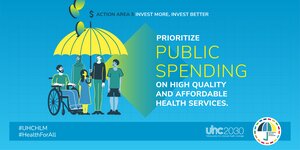
Action area 5: Invest more, invest better.
Universal health coverage is an important foundation for healthy people, societies and economies and makes countries more resilient in health emergencies. Consistent levels of public spending on health are central to progress towards universal health coverage. Primary health care is a critical investment for both universal health coverage and health security.
Reforms for universal health coverage must be prioritized in health budgets, national financing strategies and by aligning funding from international partners with national health priorities. It has been shown that increased public spending increases service coverage. While financial protection also improves with public spending, progress varies widely among countries. Improvement of financial protection can be complex, requiring systematic development of policy and of the institutions that govern and manage health systems.
Despite the current economic outlook and macro-fiscal context, countries must continue to use domestic public finances to invest more and better in their own health systems, with financing approaches that are efficient and effective, improve population health and make health systems more equitable and resilient.
Priority actions:
-
Increase and stabilize levels of public spending on health to make health systems more resilient and equitable. Focus consistent public spending on universal access to a guaranteed health benefits package, primary health care and integrated services, supported by a well- resourced health workforce. Given current levels of health expenditure, low- and middle-income countries should aspire to increase and stabilize their public spending on health, and adopt nationally appropriate spending targets, ideally at least 5% of gross domestic product (GDP) or more.* Low- and middle-income countries should catalyse and align official development assistance with national health and financing priorities for universal health coverage. They should transition to consistent, sustainable financing through domestic resource mobilization, including public–private partnerships.
-
Increase financing for primary health care to strengthen health systems and scale up services. Prioritize additional public spending on the most cost-effective, equitable package of services, and on primary health care. Low- and middle-income countries require the largest incremental investments and should direct both domestic public resources and official development assistance towards primary health care.
-
Invest more to strengthen financial protection. Use public spending on health more efficiently to ensure that everyone can access the health services they need while minimizing out-of-pocket payments throughout their life course. Increase expenditure on public health, and use pooled health financing to improve financial protection, with mechanisms such as progressive taxation and public subsidies to ensure that no one is impoverished because of out- of-pocket payments for essential health care. Resource and distribute essential health services and essential medicines throughout the country to ensure that they reach everyone in need, including the most vulnerable and disadvantaged groups.
2025 Milestones
-
Countries have improved financial protection to ensure that everyone can access the health services they need and monitor financial protection in line with the SDG 3 targets for universal health coverage.
-
Countries have increased spending on primary health care.
- Low- and middle-income countries have increased and stabilized their levels of health spending, and have adopted nationally appropriate spending targets, ideally at least 5% of GDP or more.*
-
More official development assistance is aligned to national health and financing priorities for universal health coverage, prioritizing support to primary health care.
*Cognizant of current global economic challenges, WHO, WB and OECD suggested to Member States in the lead up to the UHC High-Level Meeting to set nationally appropriate, and sustainable, spending targets for quality investments in health systems, consistent with national sustainable development strategies, and transition towards sustainable financing through domestic public resource mobilization.
Action area 6: Move together towards universal health coverage.
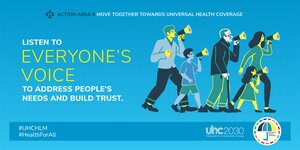
Action area 6: Move together towards universal health coverage.
Governments cannot make progress towards universal health coverage without stakeholders that play a critical role in developing, reviewing and implementing national health policy frameworks.
Systematic participation and coordination of all stakeholders make health systems more transparent and accountable, underpin the social contract between a state and its nation, and foster trust, which can be leveraged in an emergency. More can be done to strengthen the governance of multi- stakeholder ecosystems within the health sector, involving all stakeholders, including all levels of government, communities, civil society, patients, young people and the private sector.
Priority actions:
-
Champion participatory, inclusive governance and coordinate a meaningful whole- of-society approach for universal health coverage and health security. Demonstrate political priority by allocating adequate, stable financial resources for social participation and by strengthening the social contract.
-
Institutionalize mechanisms for inclusive health governance and adopt policy frameworks that enable and resource social participation. Design and implement participatory mechanisms that empower all groups in societies to participate in health decision-making, paying special attention to vulnerable and disadvantaged groups. Involve key stakeholders in accountability mechanisms for health governance, including international partners, when relevant. Align political, technical and financial resources with government priorities on accountability. Monitor and evaluate progress towards universal health coverage.
-
Promote trust and transparency by strengthening accountability in health governance. Invest in an independent national accountability body that ensures active involvement of all stakeholders. Redress conflicts of interest, power imbalances and interference from health- harming industries through well-governed processes to curtail the impact of health-harming industries on individuals and societies.
2025 Milestones
-
National health policy frameworks establish inclusive, participatory mechanisms for meaningful engagement of all stakeholders, including communities, civil society, patients, young people, the private sector, and international partners when relevant, and an independent accountability body has been established.
-
Adequate national resources have been allocated to inclusive health governance, and international resources have been aligned to national governance priorities.
Action area 7: Guarantee gender equality in health.
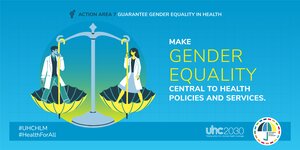
Action area 7: Guarantee gender equality in health.
Gender equality, including equal rights and equal access to services, is critical to achieving universal health coverage and leaving no one behind. Gender equality in the health workforce is a necessary component for achieving universal health coverage.
Gender equality in health drives well-being and socio-economic development throughout the life course. Policies and health services should be designed for gender-responsiveness by addressing gender inequality in the design of health strategies, policies, financing, programmes and services. Fulfilment of sexual and reproductive health and rights is low cost and effective and is imperative for making progress towards universal health coverage.
Women account for the majority of health workers and deliver most front-line essential health services. Women are, however, underrepresented in health and political leadership, and women earn on average 24% less than their male counterparts. Gender-disaggregated data are essential for improving policy design for people of all gender identities.
Priority actions:
-
Eliminate gender inequality and discrimination in the design and delivery of health policy and services. Strengthen the gender responsiveness of health policies, and scale up gender-responsive health services to address gender-related barriers to health and secure equal access for women and girls. Ensure that health services such as those for sexual and reproductive health and rights are included in the essential health benefits package and resourced and accessed, including by eliminating harmful gender norms and other gender- related barriers. Implement gender-responsive budgeting and monitoring for universal health coverage, and ensure equitable financing systems that are participatory, accessible and minimize the out-of-pocket payments that women face throughout their life course.
-
Guarantee gender equality in health systems and decision-making at all levels, close the gender pay gap, and value and appropriately remunerate unpaid and underpaid health and care workers, including community health workers. Ensure that gender-inclusive voices are heard in determining rights, leadership, representation, pay, protection and safe, decent work conditions. Reflect gender-transformative priorities in all national strategies and plans, and create time-bound targets for leadership and equal pay. Include women from diverse groups in equal numbers to men in designing universal health coverage, making decisions, accountability and monitoring from community to global levels. Protect their fundamental rights, and create healthy, safe, decent work environments free from violence, harassment and discrimination. Raise awareness and mobilize men and boys to support gender equality to achieve better health for all.
-
Collect the best available knowledge and information on gender priorities and challenges to improve policy and programme design. Measure progress with SDG indicators and a standardized set of disaggregated data. Routinely disaggregate data by gender and other stratifiers to ensure that no one is left behind.
2025 Milestones
-
Gender-responsive policies and health services, including universal access to sexual and reproductive health services, are designed and mainstreamed in national health policy frameworks, with time-bound targets and accountability mechanisms set for 2030, including targets for leadership equity, equal pay and healthy, safe, decent working conditions.
-
Countries monitor and evaluate progress towards universal health coverage in analyses disaggregated by gender and other stratifiers.
Action area 8: Connect universal health coverage and health security.
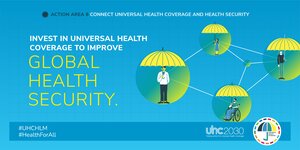
Action area 8: Connect universal health coverage and health security.
Universal health coverage and global health security are intertwined goals anchored in the health systems of every country. Leaders must act now to design and resource integrated approaches to support both universal health coverage and prevention, preparedness and response capacities for health emergencies within wider efforts to build equitable, resilient health systems.
It is imperative to integrate the lessons from emergencies and crises, including from the COVID-19 pandemic. As the world faces many challenges that impact health, including climate change, pandemics and conflicts, future health security relies on achieving universal access to health services.
Priority actions:
-
Transform health systems and foster resilience through integrated approaches that connect universal health coverage to health security in order to ensure capacity to prepare for, prevent, detect and respond to disease outbreaks and other health emergencies. For future social and economic resilience, focus on integrated planning and preparedness for service delivery, coverage and financial protection, with a focus on primary health care.
-
Build community trust in science, vaccines and public health institutions. In national health policy frameworks, prioritize expansion of essential public health functions that contribute to both universal health coverage and health security. Promote the prevention and early detection of disease through immunization services, better access to diagnostics and enhanced surveillance. Proactively act against health misinformation.
-
Protect people against interruptions in essential health services during emergencies. In national health policy frameworks and in international programming, define plans and allocate resources to ensure continued, sustained provision of essential health services through primary health care in emergencies, including supply chain continuity, financial protection and public health functions, in line with humanitarian principles.
2025 Milestones
-
National health policy frameworks have defined plans to guarantee universal health coverage that is maintained during emergencies, working closely with affected communities.
-
Integrated approaches are prioritized for investment to support universal health coverage and focusing on building resilient and equitable health systems that foster capacities to prevent, prepare for and respond to health emergencies, with clear, measurable indicators for implementation.
-
Countries routinely monitor the level of trust in health systems and have reduced health misinformation.
Information Hub
- September 2023 Newsletter: Summary of the UHC HLM and other updates
- Statement of the UHC2030 co-chairs on the adoption of the Political Declaration on Universal Health Coverage
- Recording of the UN High-Level Meeting on Universal Health Coverage
- Political Declaration of the High-Level Meeting on Universal Health Coverage
- Action Agenda from the UHC Movement
- UHC2030 newsletter subscription
- 2023 UHC Day

